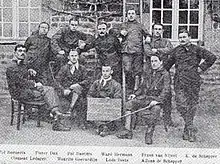Pieter Dox
Petrus Joannes Maria Dox (7 May 1898 – 26 November 1964) was a Belgian Flemish soldier during the First World War known for his opposition to the Belgian Army's French-speaking officers' discriminatory treatment of Flemish-speaking soldiers. His vocal criticism led to his dismissal from front line service and his reassignment to the Special Forestry Platoon, a penal military unit.
Pieter Dox | |
|---|---|
 | |
| Born | Petrus Joannes Maria Dox 7 May 1898 Lier, Antwerp, Belgium |
| Died | 26 November 1964 (aged 66) |
| Occupation | Christian missionary |
| Military career | |
| Branch | |
| Service years | 1916–1919 |
| Unit | Orne Woodchoppers |
| Wars | World War I |
After the war, Dox moved to the Belgian Congo where he served as a Christian missionary for the next few decades. He was killed during the Simba rebellion in November 1964.
Biography
World War I

Around 1914, Dox joined the Dominican Order as a novice. In 1916, despite a Belgian royal decree that only men born before 1897 could be conscripted, he was drafted to fight in the First World War.[2][3] As a member of the seminary, Dox had to serve in the medical corps, and after only a single month of training he was sent to the Western Front.[4]
He was critical of the French-speaking officers' attitude towards Flemish-speaking soldiers, and wrote letters on the subject. This led to his demotion to a penal military unit, the Special Forestry Platoon, on 30 March 1918, where he worked as a woodchopper as a form of penal labour in Orne, Normandy, France.[5][6] The military's official conclusion read: "Doubts regarding his patriotism. Has expressed hostility toward national institutes in a letter sent from neutral territory."[4][lower-alpha 1] Dox was released eight months after the Armistice of 11 November 1918, on 10 July 1919.[7]
One of his brothers, Ludovicus Gommarus, died in a German prisoner-of-war camp.[8] His parents were also held captive by the German occupiers due to his father's participation in the resistance movement.[9]
Missionary in Congo
Dox took his religious vows in Ghent on 7 November 1924,[10] and moved to the Belgian Congo on 18 December 1928, to work as a missionary for the next 36 years under his priest name, Valentinus.[11]
He and his brother Frans, who was also a missionary, were killed in Watsa during the Simba rebellion on 26 November 1964.[12][13] In total, 15 Belgian missionaries were killed.[11] A square in their hometown of Lier was named after him and his brother.[14][15]
References
Notes
- Translated from French: "Douteux au point de vue patriotique et avoir exprimé dans une lettre envoyée en pays neutre des sentiments hostiles aux institutions nationales."[4]
Citations
- De Vlaamsche houthakkers N.V. Ons Vaderland, Prentbriefkaart 1918 (in Dutch)
- Didden 1997, p. 198.
- De Zaeger 1995, pp. 22–23.
- De Zaeger 1995.
- Didden 1997, p. 204.
- Tom Simoens, CHTP-BEG - n° 23 / 2011. Van arrangeren tot renseigneren. Smaad en geweld Van militairen Tegen hun oversten tijdens de eerste wereldoorlog (in Dutch)
- Didden 1997, p. 215.
- Namenlijst gesneuvelde Lierenaars – Hooiktenaars (in Dutch) lier1418.be, projectgroep WOI
- Didden 1997, p. 210.
- Petrus Dox (in Dutch) odis.be, 25 October 2017
- Zes paters als bij wonder aan de dood ontsnapt Newspaper article, 1964. (in Dutch)
- Lamberigts et al. 2016, p. 98.
- Een houthakker heeft ons verlaten (in Dutch) 't Pallieterke, 1968, p. 11.
- Verklaring straatnamen (in Dutch) Lier.be, 4 February 2020
- Gebroeders Doxplein (in Dutch) inventaris.onroerenderfgoed.be
Bibliography
- Didden, K. (1997). "De Houthakkers van de Orne". Wetenschappelijke Tijdingen (in Dutch). 56 (4): 195–219. doi:10.21825/wt.v56i4.13075.
- De Zaeger, P. (1995). "Alfred van der Hallen (1901–1975) en het Vlaams-nationalisme". Lira Elegans (in Dutch). Liers Genootschap voor Geschiedenis. 5: 15–41.
- Lamberigts, M.; De Caluwe, M.; Milh, A. (2016). Predikbroeders in woord en daad (in Dutch). Antwerp: Halewijn. ISBN 9789085283935.